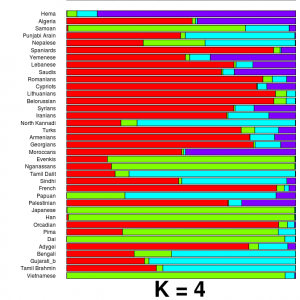 Out in Nature this week is a paper by three Genomes Unzipped authors reporting 71 new genetic associations with inflammatory bowel disease (IBD). This breaks the record for the largest number of associations for any common disease, and includes many new and interesting biological insights that you should all go and read about in the paper itself (pay-to-access I’m afraid) or on the Sanger Institute’s website.
Out in Nature this week is a paper by three Genomes Unzipped authors reporting 71 new genetic associations with inflammatory bowel disease (IBD). This breaks the record for the largest number of associations for any common disease, and includes many new and interesting biological insights that you should all go and read about in the paper itself (pay-to-access I’m afraid) or on the Sanger Institute’s website.
One thing that we did not discuss in the paper was genetic prediction of IBD (i.e. using the risk variants we have discovered to predict who will or will not develop the disease). In this post I want to outline some of the situations in which we have considered using genetic risk prediction of IBD, and discuss whether any of them would actually work in practice.
Continue reading ‘Dozens of new IBD genes, but can they predict disease?’



 Last week, a post went up on the Bioscience Resource Project blog entited The Great DNA Data Deficit. This is another in a long string of “Death of GWAS” posts that have appeared around the last year. The authors claim that because GWAS has failed to identify many “major disease genes”, i.e. high frequency variants with large effect on disease, it was therefore not worthwhile; this is all old stuff, that I have discussed elsewhere (see also my “Standard GWAS Disclaimer” below). In this case, the authors argue that the genetic contribution to complex disease has been massively overestimated, and in fact genetics does not play as large a part in disease as we believe.
Last week, a post went up on the Bioscience Resource Project blog entited The Great DNA Data Deficit. This is another in a long string of “Death of GWAS” posts that have appeared around the last year. The authors claim that because GWAS has failed to identify many “major disease genes”, i.e. high frequency variants with large effect on disease, it was therefore not worthwhile; this is all old stuff, that I have discussed elsewhere (see also my “Standard GWAS Disclaimer” below). In this case, the authors argue that the genetic contribution to complex disease has been massively overestimated, and in fact genetics does not play as large a part in disease as we believe. A couple of interesting articles this week on the Personal Genome Project and public genomics in general. Mark Henderson at the Times has an opinion piece (behind a paywall, I’m afraid) about Misha Angrist‘s book Here Is A Human Being (see also this review from The Intersection), and in the Duke Magazine Mary Carmichael has an in-depth feature on the work of George Church, with some interesting history of the early days of the PGP.
A couple of interesting articles this week on the Personal Genome Project and public genomics in general. Mark Henderson at the Times has an opinion piece (behind a paywall, I’m afraid) about Misha Angrist‘s book Here Is A Human Being (see also this review from The Intersection), and in the Duke Magazine Mary Carmichael has an in-depth feature on the work of George Church, with some interesting history of the early days of the PGP. RSS
RSS Twitter
Twitter
Recent Comments